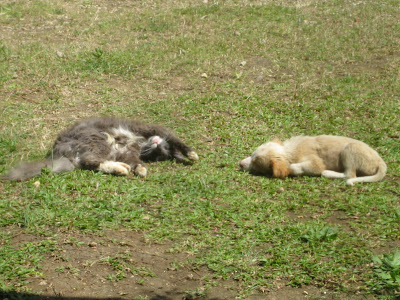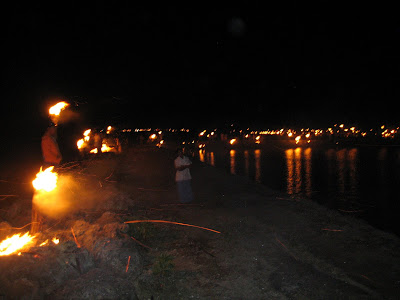I can't believe I've been here ten months already. The school year especially has flown by. When I was a kid, a year of high school seemed to last two years at least. I suspect it's partly because I don't have to write the final exams anymore, just sit there and watch my students sweat.
With the rush of end-of-year review classes and exam prep, I haven't done much traveling. I have heard about boulders the size of two-story houses on the west coast, thrown there thousands of years ago by a massive tidal wave and now sprouting underbrush and palm trees. I plan to check it out in a week or two, when school officially ends.
In the meantime, I thought I'd write down some random observations about Tonga. To explain the title,
faka-tonga is the "Tongan way." For example when something is schedule to start at 8pm but actually gets going around 9:30pm, people explain the delay by saying, "
faka-tonga." There's also
faka-palangi, which is the "European way" (including any western nation). Unfortunately there's no faka-canada, probably because there are about only (in my estimation) three Canadians in all of Tonga, and 2 Tongans in all of Canada. But there is
faka-samoa, which means going shirtless (I guess they do that in Samoa), something frowned upon (to the point that it is against the law) in Tonga. And there is
faka-suva (Suva being the capital of Fiji), which refers to living as husband and wife without being married. I chalk that one up to the old friendly rivalry between everyone in the Pacific and Fiji.
I've found that the nickname "Friendly Islands" is well earned (though Captain Cook was unaware of the locals' plot to kill him, when he thought it up). Tongans rival Canadians in politeness and hospitality. In fact, possibly more so, thanks to a cultural tendency to "save face" and avoid embarrassment at all costs. In a possibly not so fictional example, I could mispronounce a student's name for a whole year without knowing it, before realizing my mistake and being told the student didn't want to embarrass me by correcting me. This means that embarrassing a Tongan is an equal faux-pas, and you must take care in how you react to any mistake (receiving the wrong amount of change, for example).
Fish makes up a surprisingly small percentage of Tongan cuisine (unlike Fijian dishes). Local products have been replaced by exports from overseas (mainly New Zealand). The diet is high in corned beef, mutton (called
sipi in Tongan, which I purposefully mispronounce as "sheepy"), and processed foods like those packets of Mr. Noodles we ate dry as kids. There is one local dish that's a spicy raw fish salad which is fantastic. Traditionally, especially on Sundays, food is cooked for hours in underground ovens (
umu) while Tongans attend Church. They return home to massive family feasts and then nap for hours, a tradition I have embraced whole heartedly. It is illegal to do business on a Sunday, and any kind of physical work (or even music) should be kept for a minimum. It is certainly the quietest day of the week, and on Sunday afternoons streets are typically devoid of cars. I sometimes bike downtown, which resembles an old west ghost town (or a post apocalyptic zombie town at twilight).
Fruit has seasons in countries like Tonga, apparently, which is no fun at all. I miss getting fresh fruit from Florida when you can't get it from Mexico, with year-round greenhouses to fill in the gaps. I've now gone through the seasons of avocado, papaya, mandarin oranges, and have recently entered mango season, eagerly anticipating the return of avocados. Bananas and coconuts, though, seem to grow year-round.
As for wildlife, Tonga has doesn't have much of unique interest. The only local mammal is a kind of fruit bat. But not those tiny mouse-sized ones in the night cave at the Toronto Zoo. These fruit bats are HUGE, freaky huge. Bruce Wayne wouldn't need one of these to crash through his window to decide they'd strike fear into the hearts of criminals. Around nightfall When I bike to school to teach night study classes, these bats wake and fill the sky, an incredible sight. Unfortunately on my camera they're just undefined black blobs, and I've decided a picture doesn't do the sight justice. The only reptile (or whatever it is) is the gecko, whose behaviour is a constant source of entertainment. Fortunately none of those snakes that plague Australia. And of course, there are rats and cockroaches. My house kills cockroaches, which has me vaguely concerned, since I thought they were supposed to outlive all humans following a nuclear apocalypse. A cockroach that infiltrates my walls will be found dead on the floor in the morning, making me wonder if there's asbestos or lead paint or rat poison or something equally alarming. Oh, there are also black and yellow spiders the size of your palm that make my heart stop, but are deemed "completely harmless" by locals. I was once sitting on my couch when one skittered past, coming from the direction of the bathroom. I now take a good look behind the toilet before I...you know.
The weather is, ya ya, fantastic. It's what I expected when I imagined a Pacific island, it seems to cycle from hot and sunny, to warm and sunny, to cool and sunny, rinse with a cyclone and repeat. There's underwater volcano activity, and I've sat through about three earthquakes as a result. They were all the kind where you realize its an earthquake after about ten seconds, but its not shaky enough to have you run for a door frame. Because of the way the closest techtonic plate is moving (it's pulling away from Tonga instead of pushing towards, or something like that), tidal waves are not the typical result. This is especially lucky for me, because I heard that you're supposed to "seek higher ground" in the event of a tidal wave. This island is completely flat, and has about two buildings that are higher then one story, so that's not really an option. My backup solution is to tie a rope from my waist to a palm tree, and hold my breath.

In less then sixty days, my family will be coming to visit (for a week, before we go to New Zealand together). I've had to stop telling locals that my "family" is coming, and instead say, "my parents and sister," as they always assumed that by family I mean my wife and kids, because here in Tonga, how could I be in my late twenties and not have at least two kids by now!?
Faka-tonga!
 ith in many of his “first contact” situations. After ten of his sailors were killed, cooked, and eaten by Maoris, Cook wrote, “Notwithstanding they are cannibals, they ware naturally of a good disposition.” His time was cut short when he was killed in Hawaii, but in his ten years of exploration he filled in all the blank spots on the Pacific map. His legacy is everywhere in the Pacific; it was Cook who gave Tonga the nickname, “the friendly islands,” and wow Tonga went to town with that. Friendly Islands Bookstore, Friendly Islands Kayaking Adventures, The Friendly Islander Hotel, Friends Café…
ith in many of his “first contact” situations. After ten of his sailors were killed, cooked, and eaten by Maoris, Cook wrote, “Notwithstanding they are cannibals, they ware naturally of a good disposition.” His time was cut short when he was killed in Hawaii, but in his ten years of exploration he filled in all the blank spots on the Pacific map. His legacy is everywhere in the Pacific; it was Cook who gave Tonga the nickname, “the friendly islands,” and wow Tonga went to town with that. Friendly Islands Bookstore, Friendly Islands Kayaking Adventures, The Friendly Islander Hotel, Friends Café… The plaque reads: Here stood formerly the great banyan Malumalu-o-Fulilangi, under the branches of which the celebrated navigator came ashore on his way to visit Pau, the Tui Tonga on the occasion of the Inasi in the year 1777.
The plaque reads: Here stood formerly the great banyan Malumalu-o-Fulilangi, under the branches of which the celebrated navigator came ashore on his way to visit Pau, the Tui Tonga on the occasion of the Inasi in the year 1777.













































